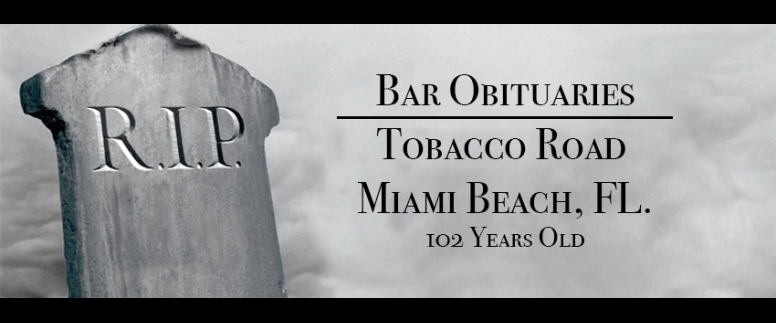
There is a hint of defiance in bartenders at historic old places about to give up the ghost. It was 5am and the bar was still serving. Tobacco Road's owner Pat Gleber said: “2am —That’s only officially when we have to stop selling. But we can still serve. And then the real party's gonna get going."
It was Miami’s oldest and most historic bar, the 102 year old Tobacco Road. It did serve its last drink at 5am. A technicality…they couldn’t sell past 2am, but no law spoke to the issue of serving.

It was the typical progressive movement: A century-old bar was to be ground under to make way for a $1.05 billion development. The Road was in the way of the proposed parking structure.
A century ago the property was probably a paltry sum in a place where no one wanted to build at all. It is amazing how the dregs eventually become the toniest place to plant the future. Two and a half years ago, the Road's property was sold for $12.5 million. And that's exactly when its end became assured. The sands in the hourglass began slipping away.
Inevitably, the century-old bar would be razed. It was just a matter of waiting around for the wrecking crew. And though the owner, Gleber, secured a three-year lease to help his employees "get new jobs, go to school," and figure out whatever's next in their lives ... Closing night has come. But then, as does all things, it did come to pass.
Surrounded in nearly every direction, construction cranes loom and Brickell CityCentre, a $1.05 billion shopping and condo development project, hovers. It seemed like a scene from a movie when you know the Alamo is about to be overrun and all the defenders are slaughtered.
First, Tobacco Road was torn apart. And then it was torn down. And then it was no more.

But in those final hours before the Road's last call ever, there wasn't much talk of doom and demolition. Barflies and bands and 4,000 other folks had simply shown up for a final good booze buzz, a last good burger, some final hours with good friends, some danceable good tunes, and one last great good time.
OK, the locals say it was like most nights at 626 S. Miami Avenue. The exception this time is that there would never be another. This was THE END..
This was the place where, back in the Prohibition 1920’s, Al Capone and other lesser-known thugs once gambled and whored, the second-floor saloon was always hot and humid and soaked, from floor to table tops, with spilled drinks.
Outside, the breezy patio was always cool and dark enough to hide a few precious moments from tomorrow's hangover. And the stage, mounted in the parking-lot was always swarmed by a couple thousand people. They would occasionally disperse between bands, zipping to the booze tent and Tobacco Road food truck and port-a-johns on beer and burger and restroom runs.
The mood may have been celebratory. However, like a Hellfire preacher, owner Eric Garcia made certain to remind any and all that the end of Tobacco Road was nigh. In the guise of a Southern preacher, he unleashed a fire 'n' brimstone sermon. Then his band heralded armageddon at Miami's oldest bar with some furious, stomping, down 'n' dirty blues.
The clock struck 5 a.m. and Tobacco Road staff slammed the gates shut on the backyard bar.
However, as owner Pat Gleber promised, there were a few free rounds of hastily gulped down leftover beers. Those remaining even drank the dregs poured from whatever random bottles remained behind the bar, essentially liquor flavored ice cubes.
Then, inevitably, the sun rose. It was time to go. There was one final look by the bleary eyed crowd at that famous neon sign before it flickered out.
And the backhoes and bobcats did their duty…




